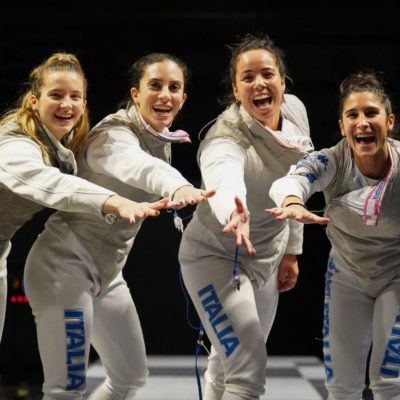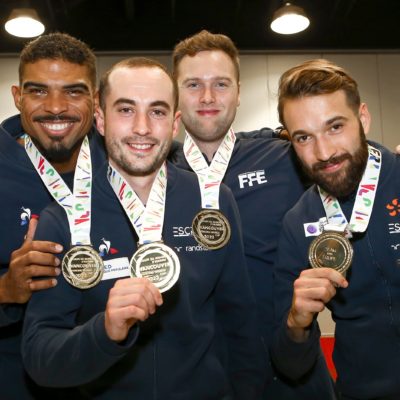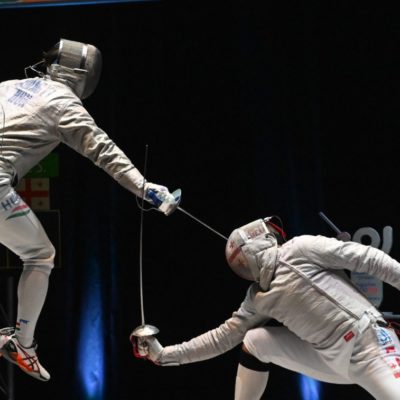Alexandra Socha of Poland talks and laughs with Serge Timacheff as she prepares to face Germany at the Tianjin Grand Prix. Socha is on the road to recovery after missing a good bit of last season.
{audio}https://fencing.net/podcast/chn-socha.mp3{/audio}
Socha has dropped from a top 10 ranking down below the 16, but she has the team up to 7th place, within striking distance for a run at an Olympic slot.
You can see Socha’s web page at: http://www.olasocha.pl/
Interviewer: Alexandra Socha of the Polish Women’s Sabre Team, you’ve had some excellent results over the last few years. I remember two years ago when you beat Mariel Zagunis in the Grand Prix in Las Vegas, and you’re definitely considered one of the world’s top Saber Sensors. Tell us a little bit about how this year is going as we come towards St. Petersburg and then beyond to The Olympic Games.
Alexandra Socha: Yeah, it was a good time for me. I was unbeaten two years ago, but the last season was really difficult for me. I have a lot of problems with my heart, that’s why I didn’t take part in many competition. That’s why I’m not now in top 16. It’s really difficult to fight in elimination, but I try to do my best, but you know, it’s just for it. Now we have team qualification that is very important for me and for my team. Now we have No. 5, and tomorrow we’ll fence with them, with the German Team. It will be really hard fight, but I am on the good way, I think. The next one will be Russian Team, and will be also very difficult, but I think, so we can do it. We can win, and I hope so. I keep one finger cross for me and for my team, and I hope that we’ll be okay.
Interviewer: So your health has improved recently, and you’re doing better?
Alexandra Socha: Yes, I think so. Now it’s everything and everything keeps okay, my doctor said that I don’t have any problems with my heart. Everything he sees on a good way. Now I’ve just finished my school, my academic and physical education. Now I have enough time for prepare myself and my team to The Olympic Games.
Interviewer: You also got married to an American, I believe, right?
Alexandra Socha: (Laughter) That’s right. It was last year in Vegas before the competition was (Laughter). It crazy, but I’m really happy.
Interviewer: A Vegas wedding.
Alexandra Socha: Exactly.
Interviewer: In the casino chapel.
Alexandra Socha: In the casino chapel, yeah. (Laughter)
Interviewer: And what is your husband’s name?
Alexandra Socha: Raphael, but he’s Polish and Raphael.
Interviewer: But he lives in the U.S.?
Alexandra Socha: Yeah, exactly. He lives in New York. I live in Poland. It’s a little bit funny and a little bit difficult for us, but everything is okay.
Interviewer: So, tell us a little bit about – since you’ve been down, now you’re coming back, and you’re also involved with a very important team qualification in a very difficult zone being the European zone of course. Tell us a little bit about your personal strategy for fencing, and a little bit about the psychology behind what you do.
Alexandra Socha: What I’m usually really do?
Interviewer: Yeah, what do you do to overcome this, you know, what’s been an obstacle?
Alexandra Socha: A handicap. (Laughter)
Interviewer: Well, not a handicap, but coming from behind again now. So, what do you do to overcome, psychologically, those issues?
Alexandra Socha: Everything, I do everything. I wake up very early, and I don’t know, breakfast, you know, the first training begins at about 9:00. The second one will be about – I don’t know, 7:00 or 6:00, between both times I rest. I do really everything.
Interviewer: How much do you train on a daily basis then?
Alexandra Socha: Twice a day, the first one it’s about two hours, and the second one, it’s about two and a half, sometimes three.
Interviewer: And what do you normally do in training?
Alexandra Socha: Fencing, sometimes – besides fencing, we are going to the – I don’t know, to another _____, and we just playing the football. I don’t know. Every kinds of sports besides fencing.
Interviewer: And who is your personal coach?
Alexandra Socha: Personal coach, Mike Lapic Procoff. On the team is Alca Disrochek.
Interviewer: How many lessons do you take on a regular weekly basis?
Alexandra Socha: I don’t know, three, four in a week.
Interviewer: Uh huh, and how long are your lessons normally?
Alexandra Socha: Twenty, thirty minutes.
Interviewer: Uh huh.
Alexandra Socha: Not longer.
Interviewer: Okay. And so, since you’ve now been to Hanoi, and you’re here in Tianjin, how are you holding up for this? It’s a long series really, two Grand Prix’s in two weeks, and then Las Vegas coming pretty soon.
Alexandra Socha: Yes, this time is very difficult for us, you know, two weeks in Hanoi, and then Tianjin. Everything is difficult. Everything is – the people is really difficult, but I’m do with this good, but we don’t have enough time when we’re back to home Monday. The next day we have a sports common we have to do so quickly. I have to wash our clothes and go directly to our sports common. We are a little bit tired, but we had to go to the sports common. Then we are going to Cuba and then to Vegas. We’ll be also to the school weeks.
Interviewer: So –
Alexandra Socha: And then from the Vegas we are back to Poland for – I don’t know, three or four days, and then we are going to the World Championships. It will be also difficult for us, because –
Interviewer: The European Championships?
Alexandra Socha: Yes, in Ghand.
Interviewer: The European Championships, right?
Alexandra Socha: Yes, it will be also qualification for us.
Interviewer: So, tomorrow you fence team, and you’re going to be fencing the Germans first.
Alexandra Socha: Yes.
Interviewer: So, tell me a little bit about your strategy as a team. How do you – because obviously with team, it’s different than individual and you have to think about who is your anchor, and who you’re going to put in, and who you’re going to take off, and if you’re gonna use an alternate, and there are many issues with team that you don’t have individually. How do you approach that?
Alexandra Socha: (Laughter) Good question. I don’t know. (Laughter) I don’t know. It’s also difficult for me, because this is though – It seems as though our team is – I don’t know what’s – it’s really good because I have a lot of friends in my team. (Laughter) It’s – I don’t know. How can I explain?
Interviewer: Well, do you have a plan as to what you’ll do with the Germans, so who’s going to anchor and who’s going to start for example?
Alexandra Socha: The last fight we’ll finish Bogna.
Interviewer: Uh huh.
Alexandra Socha: Bogna Ishnak, I think. So –
Interviewer: Do you sometimes put in your alternate first and then switch them out?
Alexandra Socha: Sometimes.
Interviewer: And why would you want to do that? What would make you want to do that?
Alexandra Socha: (Laughter) Also, I don’t know – I don’t know. How can I explain? I don’t know. It will be my secret. (Laughter)
Interviewer: Oh, okay. I see. So, what is your plan individually then for the next several weeks to train while you are traveling and going to so many events?
Alexandra Socha: To win. (Laughter)
Interviewer: But for training, what are you doing to keep up, like for example, here?
Alexandra Socha: A little bit rest. That is very important to me. Rest and rest, and a little bit take a lesson with my coach. It’s raining now. (Laughter)
Interviewer: When you’re training and you’re tired a lot, sometimes fencers find that if they take a break from fencing sometimes, even for a week or so, they sometimes come back stronger. Is that true for you?
Alexandra Socha: Yes, exactly. When I do nothing (Laughter) sometimes it’s better. (Laughter) And there will be one day that I will do nothing, for sure.
Interviewer: Okay. Well, thank you very much.
Alexandra Socha: Thank you.
[End of Audio]





